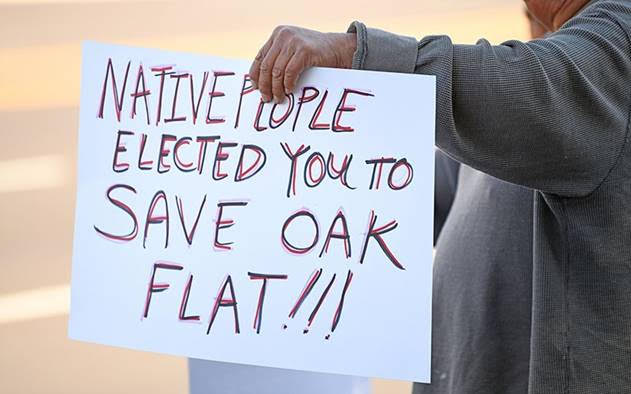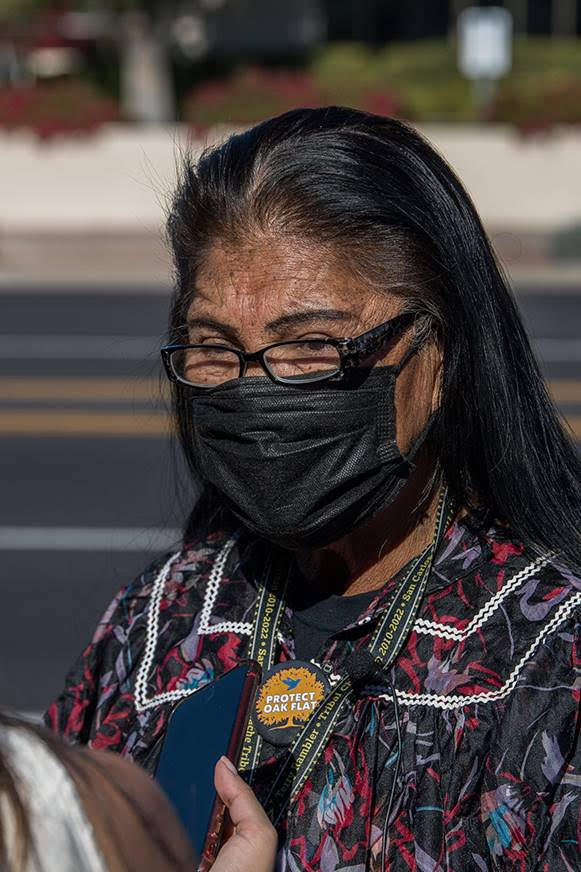
- Details
- By Native News Online Staff
Members of the San Carlos Apache Tribe, along with high school students, protested outside U.S. Sen. Mark Kelly’s office in Phoenix, Ariz. last Thursday, urging the Arizona Democrat to support legislation protecting, Oak Flat, a sacred site threatened by a proposed copper mine near Superior.
The crowd of about 20 demonstrators carried signs that read, “Save Oak Flat” and “Senator Mark Kelly – Protect Our Religion.”
Want more Native News? Get the free daily newsletter today.
Protesters want Kelly to support the Save Oak Flat Act, sponsored in the Senate by Bernie Sanders (I-VT) and in the House by Rep. Raul Grijalva (D-AZ). Neither bill has moved forward since the spring.
The bill aims to protect Oak Flat – considered sacred by Apache and other Indigenous people – from a vast copper mine proposed in the Tonto National Forest about 60 miles east of Phoenix. Mining could lead the land to collapse and leave behind a 2-mile crater.
Kelly’s office did not immediately respond to a request for comment.

Oak Flat, known to the Apache as Chi’Chil’Ba’Goteel, was federally protected until it became part of a land swap approved in a federal defense bill, slipped in by then U.S. Sen. John McCain, in December 2014. Under the deal, the federal government agreed to exchange public land that included Oak Flat to Resolution Copper, a joint venture by Rio Tinto on BHP.
The land holds religious and cultural significance to Indigenous communities, especially the San Carlos Apache, who still hold ceremonies on the land.
Brophy High School senior Aidan Parr, 18, said destroying the land is a cultural attack on the Native American community.
“If there was a huge copper deposit discovered under St. Peter’s Basilica, no one would be like, ‘Let’s mine it even if it destroys the church,’” he said.
Sandra Rambler, a San Carlos Apache, said her ancestors were buried on Oak Flat ground, so she feels strongly about keeping the land sacred and free from mining.
“Leave them alone, leave our way of life alone,” she said.
The bill follows years of uncertainty regarding the status of the land. Arguments in a lawsuit filed in January by the nonprofit Apache Stronghold were made before the 9th Circuit Court of Appeals in October.
A ruling is expected next year. The group’s website says its mission is “to battle continued colonization, defend holy sites and freedom of religion.”
Check out my latest video about sacred Apache lands in Arizona. I've tried to show what's at stake if a proposed copper mine is built on a high desert mesa called Oak Flat. Call your Congress people! #Apache #PublicLands pic.twitter.com/omY3PSmse8
— Elias Butler (@EliasButlerAZ) December 5, 2021
More Stories Like This
Native News Weekly (August 25, 2024): D.C. BriefsNative News Weekly (February 22, 2026): D.C. Briefs
NCAI Releases Sttatement on the Passing of Rev. Jesse Jackson
Colusa Indian Energy Participates in Port of Quincy Town Hall on Columbia Basin Power Project
Q&A: Jingle Dress Dancer Answered Call to Ceremony in Face of ICE Violence
Help us defend tribal sovereignty.
At Native News Online, our mission is rooted in telling the stories that strengthen sovereignty and uplift Indigenous voices — not just at year’s end, but every single day.
Because of your generosity last year, we were able to keep our reporters on the ground in tribal communities, at national gatherings and in the halls of Congress — covering the issues that matter most to Indian Country: sovereignty, culture, education, health and economic opportunity.
That support sustained us through a tough year in 2025. Now, as we look to the year ahead, we need your help right now to ensure warrior journalism remains strong — reporting that defends tribal sovereignty, amplifies Native truth, and holds power accountable.
 The stakes couldn't be higher. Your support keeps Native voices heard, Native stories told and Native sovereignty defended.
The stakes couldn't be higher. Your support keeps Native voices heard, Native stories told and Native sovereignty defended.
Stand with Warrior Journalism today.
Levi Rickert (Potawatomi), Editor & Publisher

